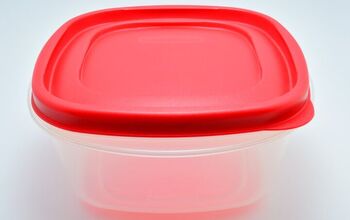How To Get Burnt Plastic Smell Out Of A Dishwasher (Do This!)

Dishwashers can rack up quite a few foul odors, many of which would raise an eyebrow with most of us. If you recently had a mishap that involved melting plastic in the wash, you probably have a machine that has the acrid smell of burnt plastic inside its chambers. Sometimes, the smell is strong enough to cling to dishes! You don’t have to live with that aroma. There are ways to remove that smell for good.
Several remedies exist that help remove the burned plastic smell out of a dishwasher. The most common ways to make it happen include:
- Baking Soda
- Vinegar
- Dishwasher Deodorizer
Getting a good grip on your dishwasher’s odors can help you avoid eating off stinky dishes. This guide will help you make sure that you get the most out of your cleaning power.
Do You Need Appliance Installation or Replacement?
Get free, zero-commitment quotes from pro contractors near you.

How To Clean Out Your Dishwasher
Melted plastic on a dishwasher’s interior is not good. Like, at all. It will jam up your dishwasher pretty badly. Leaving the plastic there can also wreck any ability to remove the scent from the washer. Here’s how you can your dishwasher clean:
- Start by turning off the dishwasher. You don’t need to unplug it, though some people prefer to do so because it’s safer to do.
- Manually pick up any pieces of melted plastic that you can. If it’s melted to the dishwasher, don’t panic, and don’t try too hard to pry it off. We’ll get that done in the next step.
- Consider using ice to “freeze” melted parts off. Leave ice on the melty parts for five minutes, then scrape any hard plastic that remained away.
- If you have any plastic residue leftover, place an acetone-based nail polish remover on it. Let it soak for about five minutes, then use a scrubber to remove the final pieces of the melted plastic.
- Mix a little dish soap and water in a cup, dip a sponge into it, and wipe down the heating element. The heating element of your dishwasher is what made the plastic melt. Wiping it down will ensure that any additional residue it has on there will be removed.
Is The Burning Plastic Smell Toxic?
While it does smell really foul, the burning plastic smell isn’t going to be as toxic as you think it is. Some studies do suggest that the smell of burning plastic (as well as burnt plastic) can contribute to the incidence of cancer.
However, if it’s a one-off, it probably won’t do that much damage. The human body is really good at filtering out toxins. As long as you work to minimize damage, you should be alright.
What Should You Do With The Plastic Item That Melted?
Honestly, it’s rarely ever a good idea to keep around a plastic item that melted. Chances are that it won’t be able to do its original function, and the truth is that you can’t bet on it being dishwasher-safe after it’s been melted. Tossing it out or recycling it (if your municipality allows for it) is the better idea.
Removing The Burnt Plastic Smell From Your Dishwasher
Now that you’ve removed the plastic from the dishwasher, it’s time to get started with the deodorization process. There are several ways to make the smell go away.
Baking Soda
To use baking soda in your dishwasher, remove any dishes that you have, and add dishwasher detergent in the soap box. Then add some baking soda to the bottom of your dishwasher. (Around 1/4 cup is usually enough!)
Run the dishwasher through a cycle, then open up the dishwasher. You should have an odor-free machine now. If not, try to use straight baking soda in the soap compartments instead.
If you don’t, grab a small bowl and pour a cup of baking soda in the bowl. Place the bowl in the dishwasher and wait three hours. The baking soda should absorb the odor pretty well.
White Distilled Vinegar
Vinegar is one of the top cleaning agents out there. Vinegar can brighten up laundry, get rid of mold on dishes, and also deodorize virtually anything. This is a fairly simple fix for your dishwasher odor. To do this deodorization method, place the vinegar in a small spray bottle. Then, spritz down the walls of your dishwasher.
Let the vinegar sit for five minutes. From there, you can choose to do one of two things: wipe it up or let it dry. If you let it dry, you won’t have a vinegary smell coming from your dishwasher. The odor from the vinegar dissipates naturally. Wiping it up is only really necessary if you have other stains on the walls of your washer.
Professional Dishwasher Cleaner
Are you at a loss of what to do? Did baking soda and vinegar both let you down? You’re not alone, but there is one other option you can choose if you want to get rid of the smell: professional dishwasher cleaner.
Dishwasher cleaners are meant to help break down food residues and deodorize your machine without harming the machine. Professional-grade cleaners are the stronger ones.
You might need to find this type of cleaner online, but it’s always doable. We suggest using Plink dishwasher cleaner since the reviews are pretty decent.
- Plank's Washer Dishwasher Freshener and Cleaner tablets deodorize and clean clothes washers and dishwashers without using any phosphates or bleach
Can’t Get The Burnt Plastic Smell Out Of Your Dishwasher?
Believe it or not, there are cases where the smell from the burned plastic will still cling to your machine after all those things got done. Unfortunately, there is not much you can do if the smell decides to cling harder than your last ex-boyfriend. Though that is pretty bad news, there’s always a silver lining.
Even the most difficult odors will eventually dissipate from your dishwasher as long as you keep it clean. In most cases, the smell will go away over the course of one to two months.
When Should You Worry?
If you have a burnt plastic smell in your dishwasher but did not actually melt any plastic items in your wash, you should worry. Burning plastic scents from your machine suggest that you might have a wire that’s starting to burn out. When combined with the ample quantities of water that come in dishwashers, you might have a fire hazard on your hand. Electrical fires can and do happen!
Anyone who has a reason to believe that they have a short circuit or burnt wire in their machine should call a repairman as soon as they can. It could end up saving your life, not to mention your kitchen!
Do You Need Appliance Installation or Replacement?
Get free, zero-commitment quotes from pro contractors near you.

Related Questions
Why does my dishwasher smell bad?
In most cases, a dishwasher with a bad odor is a sign that you have a lot of food particles that are stuck in and around the dishwasher. The leftover food is going to cause an uptick in bacterial and fungal growth. The odor that you’re smelling is the scent of bacteria and fungi breaking down the food leftover.A good way to get rid of the dishwasher odor is to clean out the washer using vinegar and baking soda. Once the food particles get drained out of the machine, the smell will dissipate fairly quickly.
What’s the fastest way to freshen a dishwasher?
Measure out one cup of white distilled vinegar, and then pour it on the bottom of the dishwasher. Let it sit for two minutes, then run your dishwasher on a standard wash setting. The vinegar should be able to break down any leftover food or grease that caused an odor in your machine.
Can vinegar be bad for dishwashers?
Like with most other things in life, moderation is key. Vinegar is highly acidic, and overuse can cause problems involving dried-out gaskets and cracked rubber parts. If it’s used in conjunction with salt, there’s also a good chance that you may start to see rust forming on both your dishwasher and your utensils.The best thing you can do is add a little bit of vinegar when you need it for cleaning purposes. Adding it just because may spark a quicker deterioration of your parts, thereby wrecking your machine.
Related Guide

Ossiana Tepfenhart is an expert writer, focusing on interior design and general home tips. Writing is her life, and it's what she does best. Her interests include art and real estate investments.
More by Ossiana Tepfenhart












![10 Best Zero Turn Mowers – [2022 Reviews & Ultimate Buyer's Guide]](https://cdn-fastly.upgradedhome.com/media/2023/07/31/9070522/10-best-zero-turn-mowers-2022-reviews-ultimate-buyer-s-guide.jpg?size=350x220)

![10 Best Cordless Leaf Blowers – [2022 Reviews & Ultimate Guide]](https://cdn-fastly.upgradedhome.com/media/2023/07/31/9070789/10-best-cordless-leaf-blowers-2022-reviews-ultimate-guide.jpg?size=350x220)












